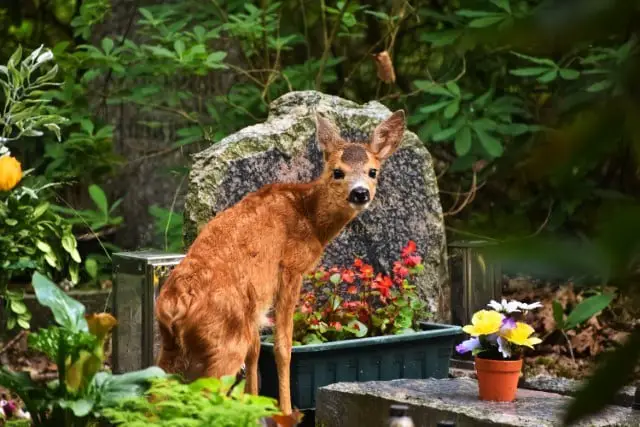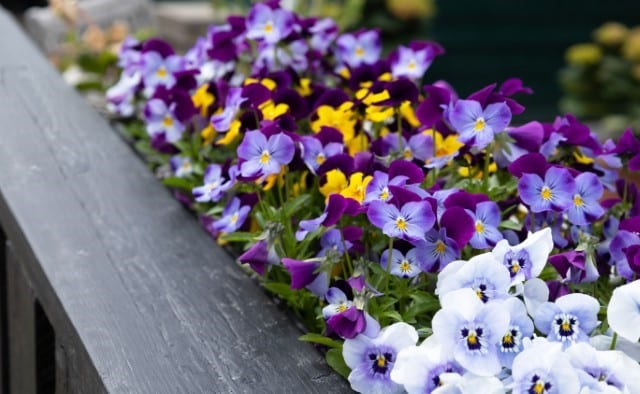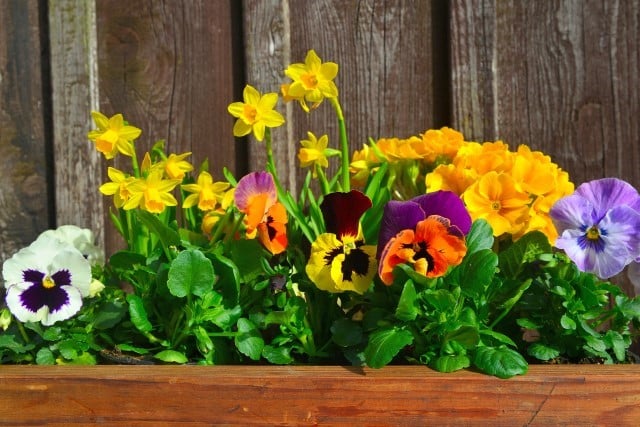Pansies are a delightful addition to any garden. But if you live in an area with white-tailed deer, then you’re surely asking if your precious flowers are safe, or if you need to take steps to keep deer out of your garden. Do deer eat pansies? Keep reading to find out.
There’s nothing quite so heartbreaking for a gardener than to see their garden decimated by pests of any kind.
And while there are helpful lists of deer resistant perennials and deer-proof annuals that you can rely on to survive your local hungry herd of deer, will pansies put your garden at risk?
Do Deer Eat Pansies? (Answered)
Yes, deer eat pansies. These flowers have a high water content and deer are attracted to that. Deer will probably eat them – especially if there is not sufficient browse for your local heard when your pansies are flower.
There’s a strong chance pansies will be damaged by deer during the early stages of flowering, but there are some steps you can take to protect them.

If you want pansies on your property, you’ll have to take proactive steps to protect them. Otherwise, they’re bound to be raided by the deer in your area.
Are Pansies Resistant to Deer?
No, pansies are not deer-resistant. Plants that are deer resistant typically have a strong odor, or a hairy texture to their leaves and stems that is a turn-off to their sensitive noses.
Deer are fond of eating protein-rich pansies. Sometimes, they are even referred to as “deer candy.”

So, how do you stop your flower beds from turning into a deer buffet?
We’ll learn about that, and more. In this article we’ll discover:
- What are pansies?
- How to keep deer out of your pansies
- How to protect your pansies from other pests
What Are Pansies?
Pansies are easy to cultivate flowering plants. They grow large, friendly-looking flowers that grow up to 3 inches in diameter.
Kids often love them because each flower looks like a cheery, smiling face.

The most common pansy variety is white, but there are also purple, yellow, and blue colors available. In some cases, pansies can grow as tall as nine inches.
Pansies are versatile flowers that can do well in many kinds of soil and sunlight conditions. However, they tend to thrive the most when they get sunshine for a minimum of six hours per day and are planted in well-drained, fertile soil.
How Do You Keep Deer Out of Pansies?
Here are some methods that you can use to defend your pansies from damage by a deer.
Install Fencing
You can try fencing your yard or garden to create a physical barrier that will keep deer out.
It will have to be at least eight feet tall, as deer can jump at least that high.
Use Deer-Repellent Spray
You can spray deer repellent in your garden and flowers around your pansies. This is especially important if you plant your pansies in the summer or autumn.
Always follow the directions that come on the product label.
Use Noise-Making Devices
There are noise-making devices on the market that you can use to scare away deer. However, they have limited efficacy because the deer eventually get used to them.
Have a Dog
The presence of a dog will often discourage deer from entering your garden.
However, you shouldn’t purchase a dog just to deter deer. If you do have a dog, however, you should let it wander around the garden more often … as long as he doesn’t trample your pansies.
Deer will perceive a large dog as a predator, encouraging them to stay away.
Add Deer-Resistant Plants
Beware of planting any other “deer candy” plants around your pansies. Popular plants like tulips, hostas, and English Ivy all tend to attract deer.

Instead, try growing plants that deer will avoid. These include plants that have strong scents, needles, thorns, and prickles.
Examples of popular deer-resistant plants include:
Protect Your Pansies from Other Pests
Rabbits and various insects are also threats to your pansies.
Rabbits
To avoid rabbits from damaging your pansies, apply dry sulfur on the perimeter of your yard. You can buy it at garden and farm supply stores.
You can also use blood meal around your pansies following each rain. As well as helping to keep away rabbits, it will add nitrogen to the soil.
Don’t use blood meal if you have dogs! It may lead them to dig and destroy your garden.
Aphids
Aphids are soft-bodied insects that appear in a variety of colors, including brown, green, pink, and almost black. They range in size from 1/16 inch up to 3/8 inch.
They feed on plant tissues and sap. In pansies, they feed primarily on the new leaf and flower stems.
As they eat, they expel honeydew that falls on nearby leaves. The development of sooty mold fungus on the honeydew results in dark fungal growth.
Many natural enemies, like lacewing and ladybird beetles (ladybugs), feed on aphids. These predators can help reduce the number of aphids.
If natural predators fail to limit the population of aphids and your flowers are still getting destroyed, you can try an appropriate insecticide.
Spider Mites
The two-spotted spider mites (Tetranychus urticae) are also known to be a problem for pansies. They’re especially likely to pose a threat in dry, hot weather.
They are tiny and are difficult to see without a magnifying lens. Mites use their piercing mouth parts to rupture plant tissue and then drink plant sap.
Homeowners with spider mite infestations may apply insecticidal soap once a week. Other pesticides that homeowners can use to combat spider mites include Bifenthrin and tau-fluvalinate.
Slugs and Snails
Snails and slugs are attracted to pansy leaves and feed on them at night. Even one night of feeding results in huge, irregular holes in flowers and leaves.

They leave behind a mucus trail that is the major sign of their presence.
To get rid of a snail and slug infestation, you should eliminate mulch around your pansies to reduce moisture. You can also manually remove the slugs and snails.
Also, try sprinkling diatomaceous earth on the plants.
Diatomaceous earth is exceptionally rough and can damage the skin of these soft-bodied creatures, leading to the loss of water and even death.
Yes, Deer Do Eat Pansies
Deer love nibbling on pansies whenever they get the chance.
Thankfully, there are an array of steps you can take to discourage these animals from decimating your flowerbeds.

Let’s review the methods we’ve talked about here:
- Install fencing
- Use deer-repellent spray
- Use noise-making devices
- Have a dog
- Add deer-resistant plants
For the best results, combine two or more of these tactics to deer-proof your pansies.


